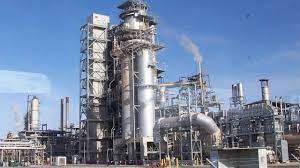The Nigerian National Petroleum Company Limited, NNPCL, is ready to deliver 300,000 barrels of crude oil per day, the Corporation’s Group Chief Executive officer, GCEO, Mallam Mele Kyari, has said.
He said this yesterday, in Yenogoa, Bayelsa State, at the opening of the fourth edition of the Nigerian Oil and Gas Opportunity Fair (NOGOF) 2023.
According to him, NNPCL has a stake in the refinery since it would leverage on it in order to deliver value to the country by making products available and enhancing in-country refining capacity.
Kyari said that Beside enormous energy is being exerted to recover local crude oil production and help the country to retain its leadership position in the continent, noting that Nigeria attained about 1.67 million daily production.
He also said efforts are being directed to increasing gas production and also deepening local consumption through various gas commercialization programmes.
News Mirror reports that as the Dangote refinery gets ready for commissioning, it has been estimated that the 650,000 barrels per day plant would yield about 21 billion dollars yearly for Nigeria.
According to a fact sheet on Dangote refinery released on Wednesday in Lagos, the plant is the world’s largest single-train 650,000 barrels per day petroleum refinery with 900 KTPA polypropylene plant.
The fact sheet drawn by the company, said: “The Dangote refinery plant is a legacy project that will see Nigeria netting 21 billion dollars per annum”.
The refinery built by billionaire industrialist Aliko Dangote, the refinery is located in Ibeju-Lekki, Lagos, covering a land area of approximately 2,635 hectares (seven times the size of Victoria Island.)
The refinery is billed for commissioning by President Mohammadu Buhari on May 22.
The facts revealed that Dangote refinery can meet 100 per cent of the Nigerian requirement of all refined products.
The products concludes (Gasoline, 53 million litres per day; Diesel, 34 litres per day; Kerosene, 10 million litres per day and Aviation Jet, 2 million litres per day) and also have surplus of each of these products for export.
Besides, the refinery is laced with 435 Mega Watts (MW) power plant, which is said to have capacity to meet the total power requirement of five states.
The facility has 177 tanks of 4.742 billion litre capacity, while the temporary housing units on the premises can house 33,000 persons.
The plant is designed for 100% Nigerian crude with flexibility to process other crudes, the fact sheet revealed that diesel and gasoline products from the refinery will conform to Euro V specifications.
For easy off-take of products, the plant is constructed with two quays with a load bearing capacity of 25 tonnes/ sq meter to bring Over Dimensional Cargoes close to the site directly.
It constructed two more quays in the port with a capacity to handle up to Panamax vessels to export the fertiliser and the petrochemicals and two quays to handle liquid cargoes.
The port will thus have six quays, including a Roll-on/Roll-off quay.
The Dangote is one of the few companies in the world executing a Petroleum Refinery and a Petrochemical complex directly as an Engineering, Procurement, and Construction (EPC) Contractor.
Globally, apart from three companies, no individual owner has done the complete EPC Contract for a Petroleum Refinery.
The company is training of 900 young engineers in refinery operations outside the country, while another six mechanical engineers were trained in the GE University in Italy.
Also, 50 process engineers have been trained by Honeywell/UOP for six months; and 50 management trainees.
Meanwhile, the NOGOF 2023 will explore emerging opportunities in the oil and gas industry, linkage sectors as well as the entire African continent, the Executive Secretary of the Nigerian Content Development and Monitoring Board (NCDMB), Engr. Simbi Kesiye Wabote said on Thursday.
He explained that NOGOF was conceptualized in 2016 as part of the Board’s strategies to develop the oil and gas industry and provide a platform to showcase the various opportunities available in the oil and gas industry and foster necessary partnerships in the sector.























